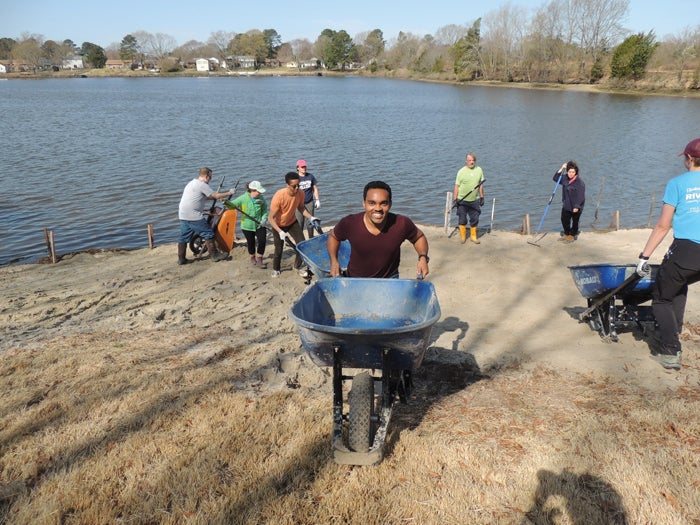Catawba students assist with living shoreline and wetland restoration project in Virginia
Published 12:00 am Thursday, April 18, 2019

- Catawba students assist a private homeowner on a living shoreline and wetland restoration project along the banks of a branch of the Elizabeth River in Virginia.
In March, Professor Jay Bolin, chairman of the biology department at Catawba College, and 13 students in his natural resource and ecology management class drove to Virginia Beach, Virginia, to partner with the Elizabeth River Project.
They assisted a private homeowner on a living shoreline and wetland restoration project along the banks of a branch of the Elizabeth River.
The Catawba group shoveled and helped move more than 60,000 pounds of sand along Howard Shock’s waterfront property to help prevent erosion and regrade the shoreline in a sustainable way. Shock’s home on Woodstock Cove has been designated a River Star Home, an environmental stewardship designation by the Elizabeth River Project.
Bolin learned through a colleague about this restoration project.
“This student activity with the Elizabeth River Project was a perfect experiential learning opportunity for my class because of the economic and ecological importance of wetlands,” Bolin said.
Living shorelines help prevent erosion and support wetlands and shallow water habitat that provide crucial ecosystem services, such as improving water quality and providing nursery areas for fish and crabs. They use natural materials, like the coconut fiber logs used at the Shock residence, but oyster castles and other materials can be used as well.
For Shock, an amateur birder and naturalist, it was a happy day: the beginning of returning his shoreline to what it used to be, when invasive phragmites used to cover a hill overlooking the shore.
Although moving the sand is just the start, Shock said he’s already looking forward to planting a buffer with around 20 native species to include sweeps of host and nectar plants covering the hill, elevation-specific wetland plants hugging the shoreline. Cord grass, Joe Pye weed, bee balm and buttonbush are just a few of the species planned in the colorful design.
Catawba students camped at First Landing State Park in Virginia Beach. Their two-night excursion included a tour the Chesapeake Bay Foundation’s Brock Environmental Center, one of the most environmentally smart buildings in the world on the shores of the Lynnhaven River in Virginia. where they learned about the human history and fire ecology of longleaf pine in the Zuni Pine Barrens, the most northern intact longleaf pine community.
Jack Cline of Statesville, a senior environment and sustainability major at Catawba College, had his rapidly approaching graduation in May on his mind throughout the project.
“These types of ecological activities are helping me build my resume with skills and things I can talk about during job interviews,” Cline said.
Cline’s environment and sustainability professors, including Bolin, are sure that he will do just fine on the job market.
“It’s time for our senior students to get out there and use their training to make a difference,” said Bolin.





